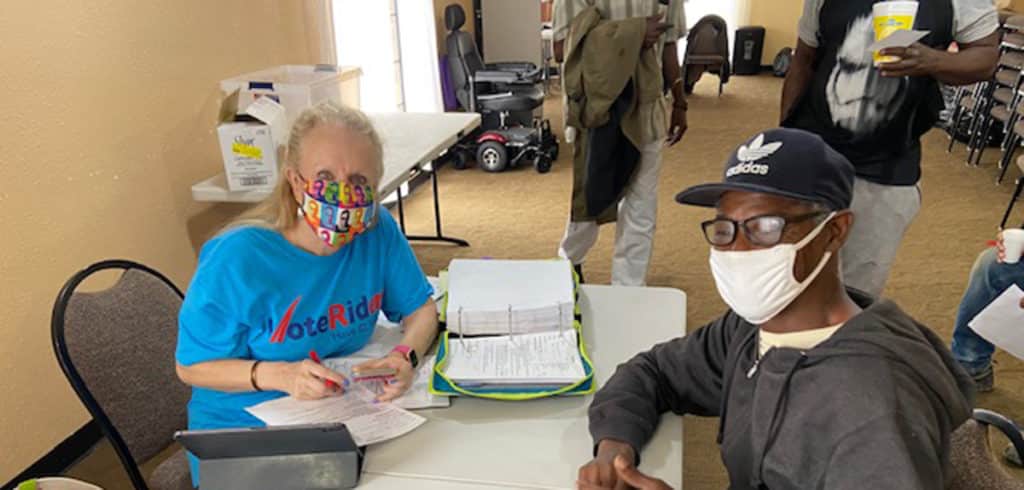
Digging Deep in North Carolina
Today, proper identification is critical for Americans to be able to vote. However, having that precious ID can also be the passport to changing an individual’s life for the better, in important and unexpected ways.
Randy is one such person. Randy lived on the street and faced the common barriers that people experiencing homelessness have in getting an ID. He was required to go in person to the DMV, which meant he needed to set up an appointment in advance – a challenge for someone without a phone, a computer or transportation. However, with the help of his social worker and VoteRiders staff member Pam Pearson, Randy got the appointment, made the trip, had his paperwork accepted, and received that coveted ID. Fortunately, obtaining this documentation had other huge benefits for his life. It turned out that the only impediment Randy faced to getting stable housing was the lack of the proper ID to prove that he was who he said he was. Now, he could qualify for permanent housing, the key that helps people to live independently and be self-sufficient. In a twinkling and with determination, Randy’s life changed.
In addition to her role as General Counsel at VoteRiders, Pam is the organization’s North Carolina Voter ID Coalition Coordinator. She explains that North Carolina was in a unique situation in 2020, with voting ID requirements suspended because of legal challenges to the latest law. Therefore, no ID was required as long as voters had provided their driver’s license or state ID number or the last four digits of their Social Security number when they registered. If they skipped that step, under federal law they had to bring to the polls or enclose with their mail-in ballot an unexpired photo ID or a document with their name and address, such as a utility bill.
“This suspension of ID requirements is a temporary situation,” explains Pam. “We know people will need an ID for upcoming elections. So, we continue our work in helping people with this task, focusing especially on three groups who have special challenges in getting their documents: the homeless, survivors of domestic violence, and returning citizens who are no longer incarcerated. We found that not only are we preparing them to be able to exercise their right to vote, but that with this assistance they could now become employed for the first time and obtain safe housing.”
Victor was another person facing particular challenges. Born and raised in the Northeast, he had served time in prison in a Southern state before moving to North Carolina. In order to get his birth certificate, he needed an ID. To get an ID, he needed a birth certificate. Meanwhile, Victor was enrolled in a substance abuse program to overcome an addiction. Upon release, he would need housing and a job, but was restricted to doing cash-pay odd jobs because no one would permanently employ him without an ID.
Pam dug deep into his case and found a unique solution. His driving record contained all the relevant information needed by the DMV to issue a state ID. With Pam pointing out how this official document provided the information required according to posted DMV guidelines, Victor advanced through the various checkpoints – until the last one, when the employee questioned his paperwork. Prepared to receive yet another “no,” Victor was astonished when Pam pressed the issue and did a comparison of guidelines and the reports she had obtained. Finally, Victor got his “yes.” That day he walked out with a commitment for a state ID and was able to accept the permanent job he had been offered, a job which was the key to safe housing, staying sober, and living on his own.
Helping people with their ID during COVID isn’t easy, especially for these three vulnerable groups. Many shelters are not necessarily the safest from infection, due in large part from situations they cannot control. At the same time, given the impact of the pandemic, more people have become homeless and have experienced domestic violence. Wearing masks, Pam and her trained volunteers set up Voter ID Clinics in rooms at shelters large enough to stay distant from each other and their attending prospective voter.
“As these individuals go through the process of getting an official ID, often for the first time, they may not be thinking about voting,” noted Pam. “I remind them that their ID will now enable them to vote, regardless of the final law’s provisions. They respond well when I point out that local, city and county elected officials in particular have a big impact in their lives, including allocations for shelters, food and assistance of all kinds.”
In many cases, getting creative about finding proof that people are who they say they are is essential. One gentleman in his 60’s, who had been incarcerated, had never voted in his life. A helpful clerk of the court investigated his files to find a court record that he needed for his ID, and the second piece of proof came from his high school librarian when she found his picture in the school yearbook! She even hunted up a second copy of the book so he could have one to take to show proof of his identify. This year, he voted for the first time.
Clearly there are huge potential benefits to finally securing an official ID. “It is as if people are left feeling that they don’t count, they aren’t real,” noted Pam. “With that ID, they join society as a full-fledged citizen. And when the next election rolls around, they are ready and prepared to cast their ballot.”
Guest Post by Joy Scott
